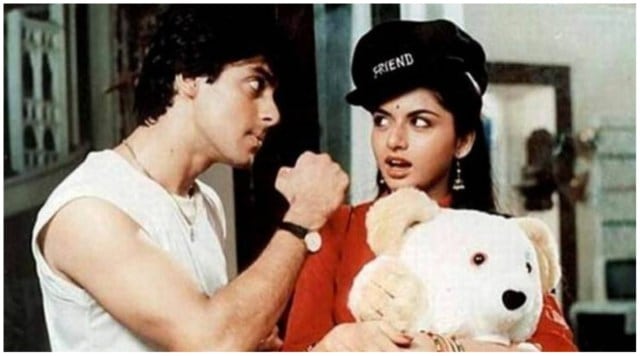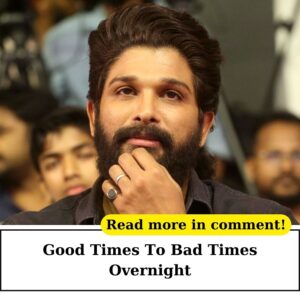On Salman Khan’s 57th birthday, here’s looking back at the many phases of his career, from being Prem to the failed experiments, and finally establishing himself as Bhai of Bollywood.
 Salman Khan and Bhagyashree in a still from
Salman Khan and Bhagyashree in a still from
For Gen Z, Salman Khan is Bhai—the tough, poker-faced muscled man, who can fight off an entire army of goons. This image brimming with machismo almost cannot be connected with the romantic idealist version of Salman who ruled the 90s. If Shah Rukh Khan was the smooth-talking Rahul or Raj, ironically, Salman was the good son, brother and husband Prem, even though off-screen, he was the quintessential bad boy of Bollywood.
The many Prems, comedy and action of the 90s
While Salman Khan made his debut with the 1988 film Biwi Ho To Aisi in a supporting role, it was his leading role in Sooraj Barjatya’s romantic drama Maine Pyar Kiya (1988) that brought him the spotlight. In the first iteration of Prem, Salman played the badly-behaved son of a rich family, who changes his ways after meeting the simple Suman (Bhagyashree).
However, as always Bollywood parents are the biggest obstacles and after much heartache, Prem leaves aside his life of luxury to prove himself to Suman’s father.
Despite the success of the film, Salman later admitted that he did not get work for 4-5 months, till his father Salim Khan intervened and requested GP Sippy to sign Salman for Patthar Ke Phool.
After enjoying a few moderate successes, Salman once again scrabbled to stardom after playing Prem (again) in Sooraj Barjatya’s Hum Aapke Hain Koun (1994).
This time, Prem wasn’t the arrogant or badly-behaved fellow who needed a woman to change his ways—-he was already the image of perfection. He was the ideal son, brother and cutesy lover, who was willing to sacrifice the love of his life for his brother.
The film emerged as one of the biggest blockbusters of the year and Salman had established himself as one of the leading stars. He also starred in the comedy Andaz Apna Apna as Prem, a man trying to win over a rich woman’s heart, while getting entangled in an absurd comedy of errors.
The film failed at the box office, but attained cult status over the years. It also proved Salman’s prowess at slapstick comedy. For the era, he melded in well. Towards the end of the ‘90s, Salman played another Prem in Sooraj Barjatya’s Hum Saath Saath Hain. This Prem was the serious and quiet virtuous type.
Yet, while Prems dominated his ‘90s career, Salman tried various roles—he starred in the action film Karan Arjun, where he played a vengeful reincarnated son alongside SRK. He also starred in David Dhawan’s comedies, Judwaa and Biwi No. 1, establishing himself as an all-round star.
The ‘90s also saw him accepting the roles of a defeated lover, including his surprise cameo in Kuch Kuch Hota Hai where he loses Kajol to SRK and Hum Dil De Chuke Sanam, where Aishwarya Rai leaves him for Ajay Devgn. Salman checked all the boxes of the era—the over-the-top comedy, action and the run-around-the-trees romance.
Experimental early 2000s
Salman Khan experimented wildly in 2000s, albeit without much success. In 2001, Salman starred in Chori Chori Chupke Chupke, which addressed the issue of surrogacy—a rare topic for Hindi films then. In 2002, he featured in the disastrous Hum Tumhare Hain Sanam, that refused to take off despite featuring Madhuri Dixit and Shah Rukh Khan—it was a reminder that what worked in the 90s wasn’t going to be successful in the 2000s.
And then came Tere Naam in 2003, which gave way to the army of Bhai fans with parted hair and net vests. The romantic drama, which also faced much criticism, saw Salman showcasing his broken and vulnerable side, something he hadn’t quite done before. In the middle, there were other forgettable films including Tumko Na Bhool Na Paayenge.
But Salman wasn’t going to give up, he still wanted to make his own image for the 2000s. So, he tried comedies like No Entry and Mujhse Shaadi Karoge, which worked well. In a rare move, there was the dark and disturbing Kyun Ki with Kareena Kapoor, where he played the role of a patient in a mental health facility.
With 2009 film Wanted, Salman Khan’s game changed for good. Salman worked with Prabhudheva for the first time in Wanted, which was a remake of the Telugu blockbuster Pokiri. Filled with over-the top massy dialogues, and unique dance steps, Salman carved a new image for himself and became the symbol of machismo. The film crossed Rs 100 crore at the box office, and it was his first Eid release, kicking off a tradition that his fans would soon eagerly start waiting for.
There was no looking back after this—gone were the days of mushy, cutesy or effusive dialogues, it was the time for one-liners that would inevitably make it to bhai fan tweets. So, fans began spouting lines like “Ek baar jo maine commitment kar di” from Wanted, followed by the likes of “Mujhpe ek ehsaan karna, mujhpe koi ehsaan mat karna”, “Zindagi mein teen cheezein kabhi underestimate mat karna – I, Me, aur Myself” and “Swagat nahi karoge hamara”.
Soon, the Dabangg franchise followed, where Salman Khan played a rowdy cop and then along came the Tiger franchise. Now he was the super spy who could beat up people single-handedly but didn’t have much control over his heart when it came to Katrina Kaif’s Zoya.
The era of Rs 300 crore blockbusters for Salman dawned, and stayed with Bajrangi Bhaijaanin 2015. Salman remained Bhai regardless of whether his films worked or not, even if they were appalling failures like Race 3.
He remained indifferent as he knew that his worst films still minted money at the box office, and he could care less about critics. Salman hasn’t witnessed too many successes of late despite the tough-and-gruff actioners, but at this point in his career, it doesn’t affect his fans or his stardom, least of all him.
News
Boxer Amir Khan and his wife Faryal Makhdoom separate and living apart after he was caught s3xting a model just weeks before their 10th wedding anniversary
Amir Khan and his stunning wife Faryal Makhdoom have reportedly separated and are currently living apart after the former world champion boxer was caught sexting another woman….
Amir Khan’s marriage plunged into fresh crisis after woman claims they romped in hotel during four-month fling
LOVE-cheat Amir Khan’s marriage has been plunged into fresh crisis — after a woman told how they had a night of hotel sex. The former boxing champ,…
Amir Khan and wife living separately after shock sexting confession
The former World Champion boxer is reportedly living apart from his wife, Faryal Makhdoom, after the pair separated. Amir Khan and wife Faryal (Image: amirkingkhan/Instagram) Our community members…
10 Bollywood celebrities who made it big despite less education!
Education is seen as a necessity for securing good jobs and careers and success in life. However, there are many prominent actors in Bollywood who are either…
Saif Ali Khan Calls Himself A ‘Fish-N-Chips’ Guy Infront Of ‘Emperor’ Shah Rukh Khan, Adds “Salman Khan Has Been A Superstar From His First Shot”
Saif Ali Khan has worked with Salman Khan and Shah Rukh Khan. Saif Ali Khan Calls Himself A ‘Fish-N-Chips’ Guy Infront Of ‘Emperor’ Shah Rukh Khan &…
Amir Khan apologises to his wife Faryal Makhdoom over sexting scandal
Statement comes amid reports of his separation from the model Photo via Instagram/Faryal Makhdoom Former British boxer Amir Khan has apologised to his wife Faryal Makhdoom over…
End of content
No more pages to load











